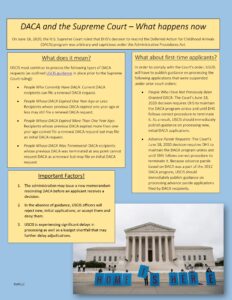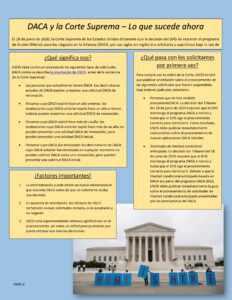On June 18, 2020, the U.S. Supreme Court ruled that DHS’s decision to rescind the Deferred Action for Childhood Arrivals (DACA) program was arbitrary and capricious under the Administrative Procedures Act.
The agency failed to consider “important aspects of the problem before the agency.” Specifically, the Court concluded that DHS failed to consider whether to continue only the deferred action part of the DACA program and that “omission alone renders [the decision] arbitrary and capricious.” In addition, the Court found that DHS failed to address the considerable reliance interests created by the DACA program, such as the impact on Dreamers and their families, if the agency terminated DACA.
What is the impact of this decision?
USCIS must continue to process the following types of DACA requests (as outlined USCIS guidance in place prior to the Supreme Court ruling):
- People Who Currently Have DACA: Current DACA recipients can file a renewal DACA request.
- People Whose DACA Expired One Year Ago or Less: Recipients whose previous DACA expired one year ago or less may still file a renewal DACA request.
- People Whose DACA Expired More Than One Year Ago: Recipients whose previous DACA expired more than one year ago cannot file a renewal DACA request but may file an initial DACA request.
- People Whose DACA Was Terminated: DACA recipients whose previous DACA was terminated at any point cannot request DACA as a renewal but may file an initial DACA request.
In order to comply with the Court’s order, USCIS will have to publish guidance on processing the following applications that were suspended under prior court orders:
- People Who Have Not Previously Been Granted DACA: The Court’s June 18, 2020 decision requires DHS to maintain the DACA program unless and until DHS follows correct procedure to terminate it. As a result, USCIS should immediately publish guidance on processing new, initial DACA applications.
- Advance Parole Requests: The Court’s June 18, 2020 decision requires DHS to maintain the DACA program unless and until DHS follows correct procedure to terminate it. Because advance parole based on DACA was a part of the 2012 DACA program, USCIS should immediately publish guidance on processing advance parole applications filed by DACA recipients.
It’s important to consider several factors when deciding whether to submit a new, initial DACA application before guidance is issued, including: 1) the possibility that the administration may issue a new memorandum rescinding DACA before the applicant receives a decision; 2) that – in the absence of guidance – USCIS officers will reject new, initial applications or accept them and deny them; and 3) that USCIS is experiencing significant delays in processing as well as a budget shortfall that may further delay adjudications. Given uncertainty surrounding DHS plans, and also given the state of travel during the COVID-19 pandemic, it is not recommend for those with DACA to apply for advance parole until DHS weighs in on the issue.
AILA Doc. No. 18011035
Infographic:


